Unit 2 It's Show Time! Lesson 12 A Blog about the Silk Road 课件(共39张PPT)
文档属性
| 名称 | Unit 2 It's Show Time! Lesson 12 A Blog about the Silk Road 课件(共39张PPT) | 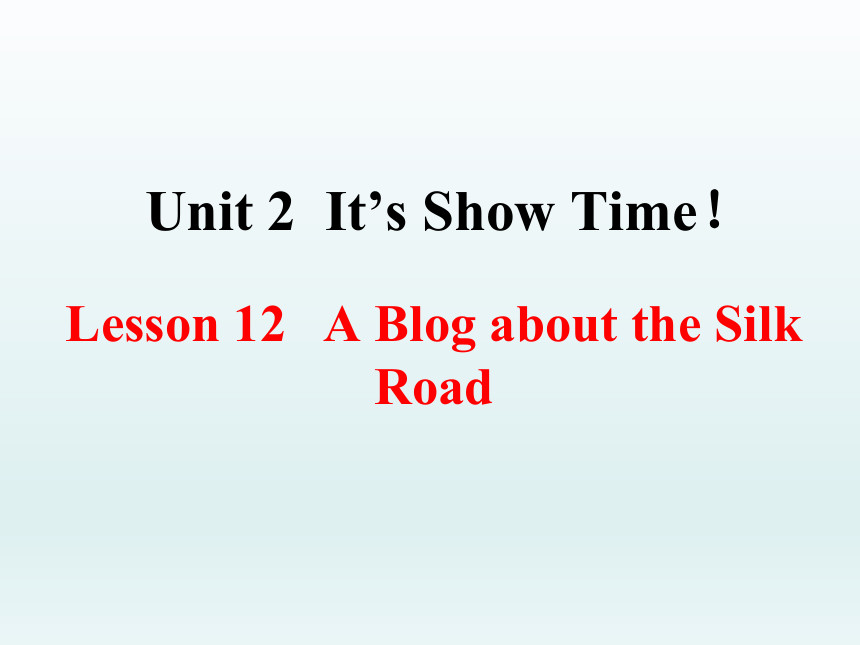 | |
| 格式 | zip | ||
| 文件大小 | 727.5KB | ||
| 资源类型 | 教案 | ||
| 版本资源 | 冀教版 | ||
| 科目 | 英语 | ||
| 更新时间 | 2023-04-26 07:38:52 | ||
图片预览



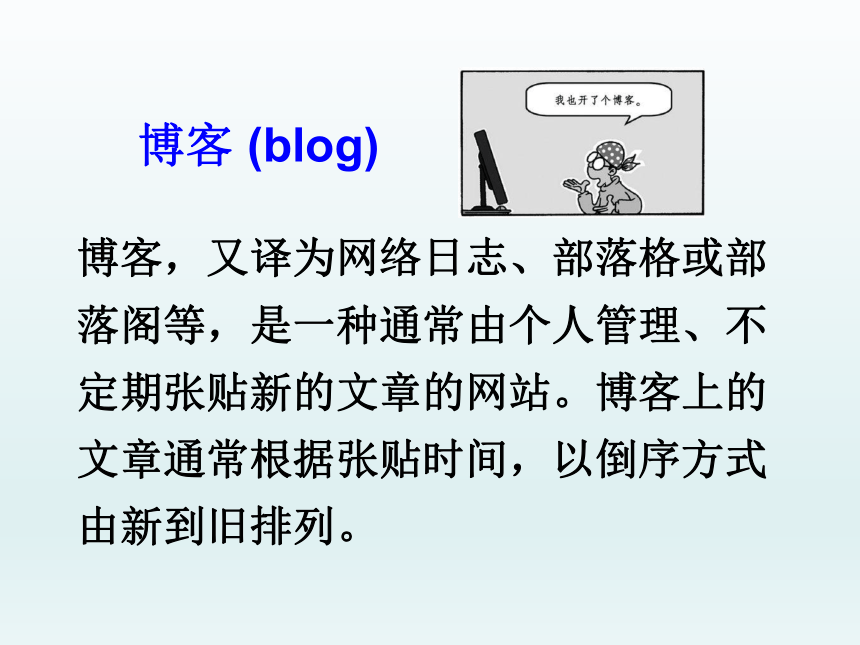
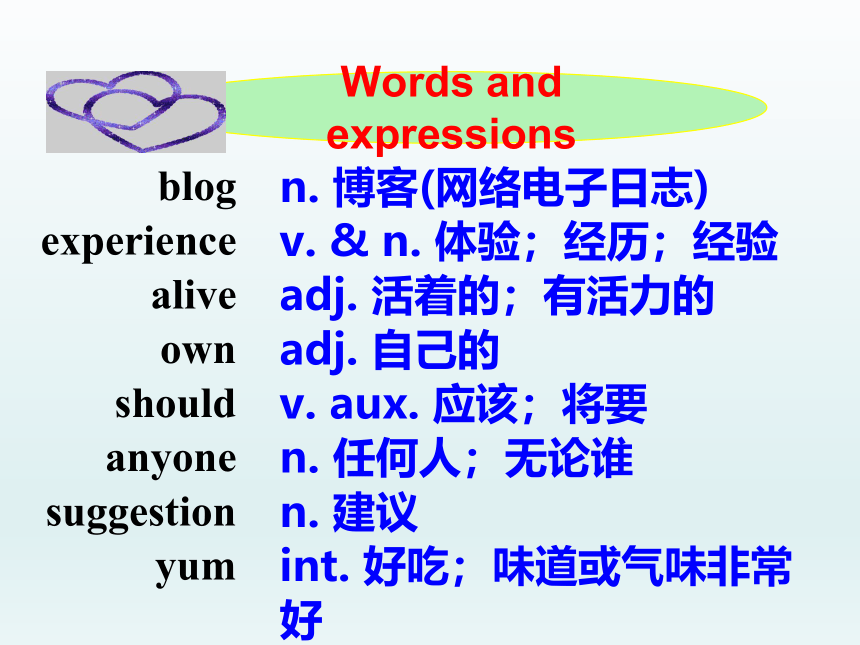
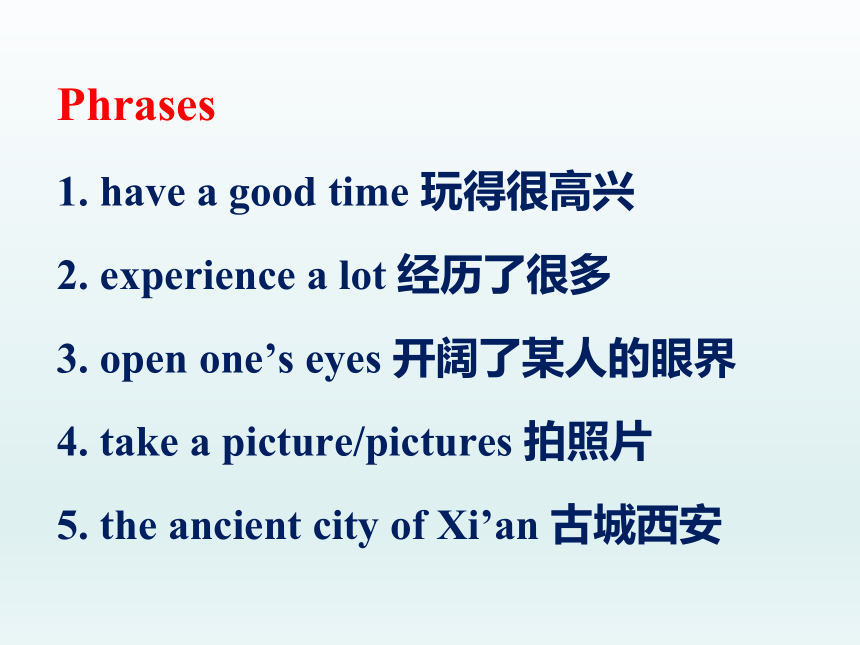
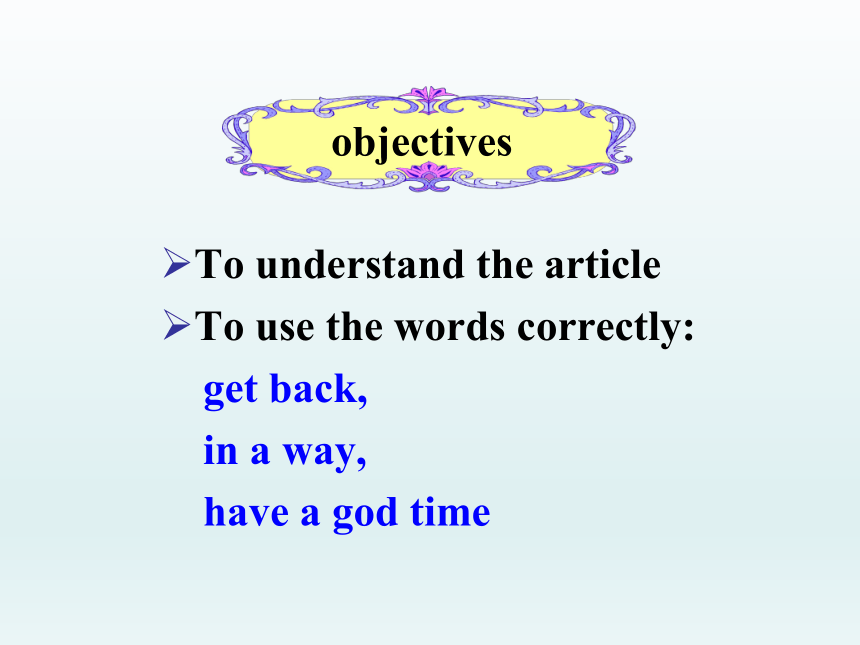

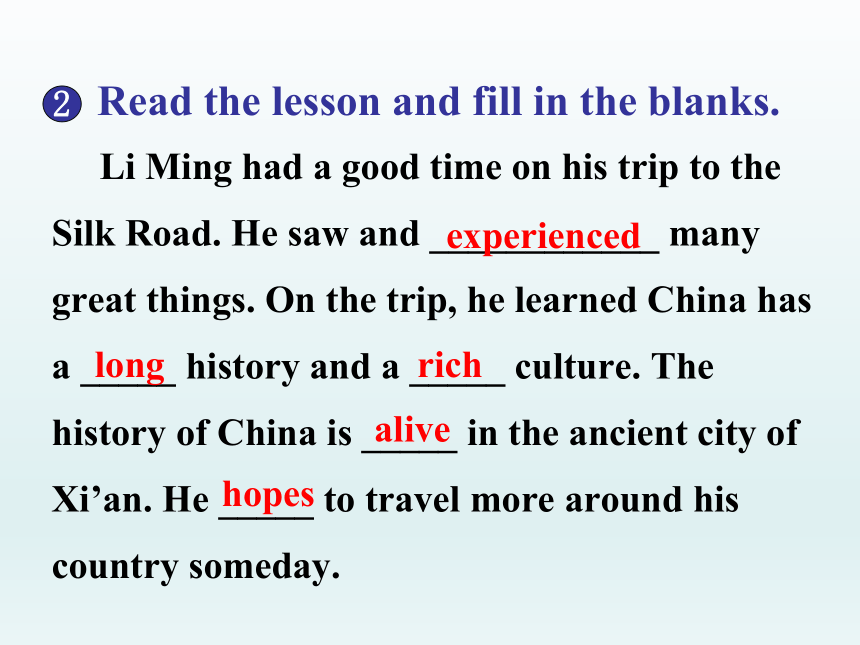
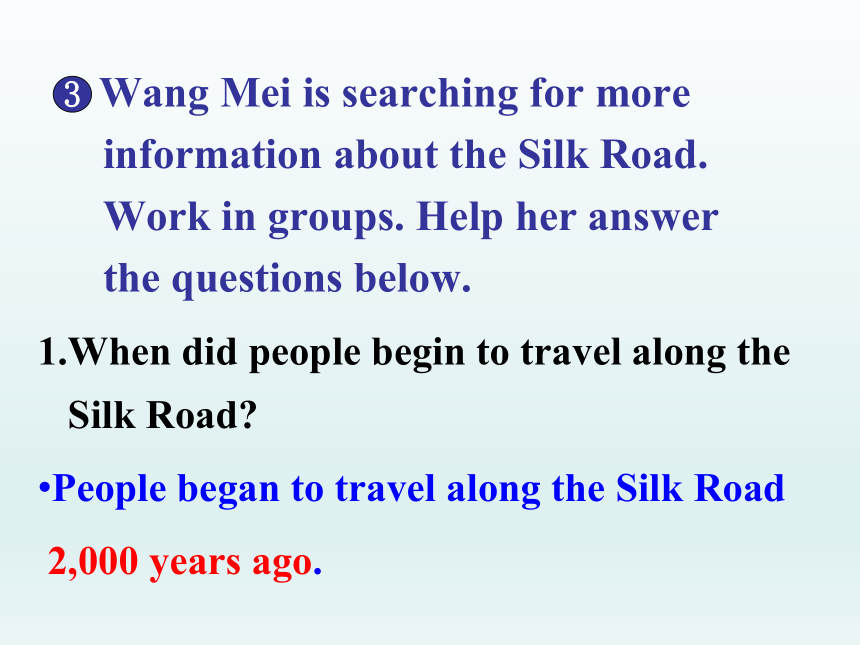
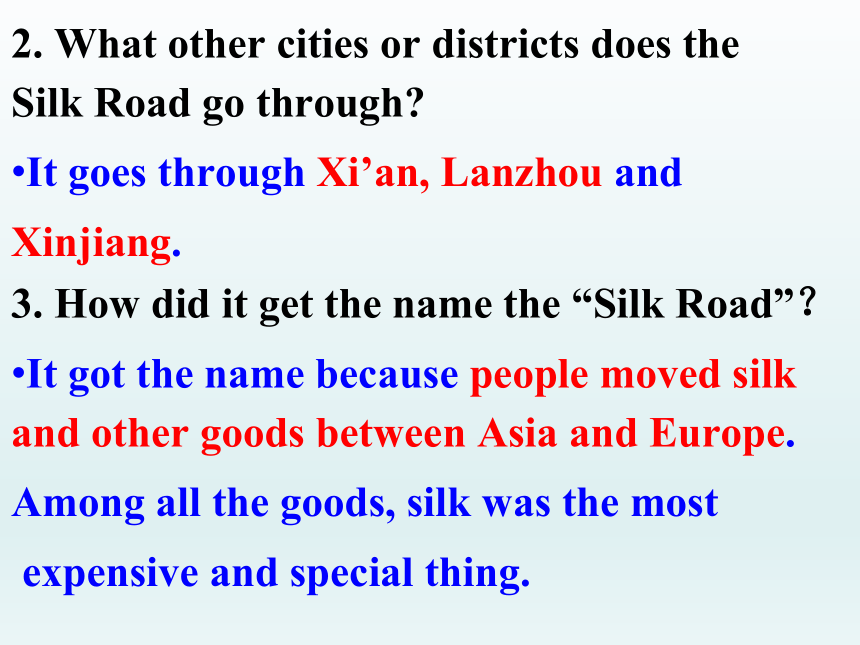
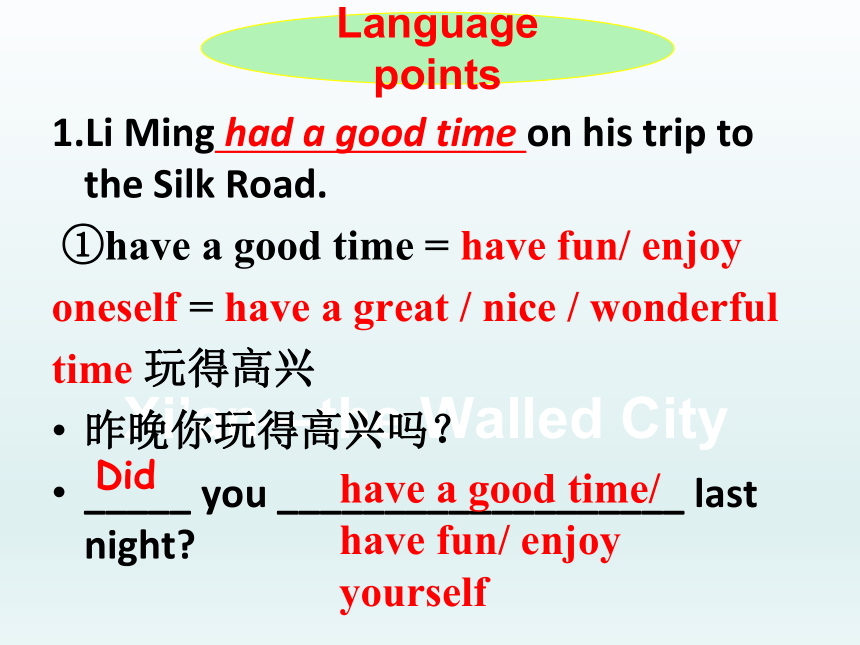
文档简介
(共39张PPT)
Unit 2 It’s Show Time!
Lesson 12 A Blog about the Silk Road
Lead in
Do you have a blog
What do you usually do on the blog
You can write anything you like in your blog. A trip must be the most popular one. You can write about your trip, show some photos, and share some stories and food.
博客,又译为网络日志、部落格或部落阁等,是一种通常由个人管理、不定期张贴新的文章的网站。博客上的文章通常根据张贴时间,以倒序方式由新到旧排列。
博客 (blog)
Words and expressions
blog
experience
alive
own
should
anyone
suggestion
yum
n. 博客(网络电子日志)
v. & n. 体验;经历;经验
adj. 活着的;有活力的
adj. 自己的
v. aux. 应该;将要
n. 任何人;无论谁
n. 建议
int. 好吃;味道或气味非常好
Phrases
1. have a good time 玩得很高兴
2. experience a lot 经历了很多
3. open one’s eyes 开阔了某人的眼界
4. take a picture/pictures 拍照片
5. the ancient city of Xi’an 古城西安
objectives
To understand the article
To use the words correctly:
get back,
in a way,
have a god time
Let’s Do It!
Which pictures does Li Ming NOT mention Listen to the passage and tick.
1
×
Read the lesson and fill in the blanks.
2
Li Ming had a good time on his trip to the Silk Road. He saw and ____________ many great things. On the trip, he learned China has a _____ history and a _____ culture. The history of China is _____ in the ancient city of Xi’an. He _____ to travel more around his country someday.
experienced
long
rich
alive
hopes
Wang Mei is searching for more
information about the Silk Road.
Work in groups. Help her answer
the questions below.
3
1.When did people begin to travel along the
Silk Road
People began to travel along the Silk Road
2,000 years ago.
2. What other cities or districts does the Silk Road go through
It goes through Xi’an, Lanzhou and
Xinjiang.
3. How did it get the name the “Silk Road”?
It got the name because people moved silk and other goods between Asia and Europe.
Among all the goods, silk was the most
expensive and special thing.
Xi’an—the Walled City
Language points
1.Li Ming had a good time on his trip to the Silk Road.
①have a good time = have fun/ enjoy
oneself = have a great / nice / wonderful
time 玩得高兴
昨晚你玩得高兴吗?
_____ you ___________________ last night
Did
have a good time/ have fun/ enjoy yourself
②on one’s trip to...意为:
“在某人去……的旅行中”。
eg:I lost a book on my trip to Beijing.
在去北京的旅途中,我丢了一本书。
Xi’an—the Walled City
2. I just got back from a great trip to
the Silk Road.
get back to = return to… 回到……
get back home 回到家
翻译:
今年夏天他将回到北京。
He will get back to Beijing this summer.
【易错点】
experience
①意为“经验”时为不可数名词。
eg: My Chinese teacher has a lot of
experience in teaching.
我的语文老师教学经验丰富。
②意为“(一次)经历,体验”时为
可数名词。
eg: That’s a wonderful experience for me.
对我来说那是一次愉快的经历。
3. I saw and experienced a lot on the trip.
experience n./v. 体验;经历;经验
Xi’an—the Walled City
1)她在教学上经验丰富。
2)对我来说,那是一次愉快的经历。
3)她体验到了帮助别人的快乐。
She has a lot of experience in teaching.
That’s a wonderful experience for me.
She experienced the joy of helping others.
4) 她体验到了帮助别人的快乐。
She experienced the joy of helping others.
Xi’an—the Walled City
◆I had a rather strange experience last Sunday.
上周日,我有一次相当奇怪的经历。
◆Even experienced teachers can make mistakes.
即使有经验的教师也可能犯错误。
Xi’an—the Walled City
4. The history of China is so alive in these places.
辨析 alive, living, live, lively的区别
alive 形容词 活着的,有活力的 既可以指人,也可以指物。(表语)
living 形容词 活着的;活的 即可指人,也可指物。(定语)
名词 生存;生计 make a / one's living 谋生
live 形容词 现场的 现场直播
动词 居住;生存 不及物动词,常和介词in 连用表示“住在...”
lively 形容词 活泼的;有生气 既可指人,也可指物。多作定语。
Xi’an—the Walled City
The old man is still alive.
那位老人还健在。
There is live music in the club most nights.
该俱乐部大多数晚上都有现场表演。
My grandparents live in Shanghai.
我的祖父母居住在上海。
She is one of the best living dancers.
她是健在的最好的舞蹈家之一。
The old man makes a living by selling vegetables.
那个老人靠卖菜为生。
Wang Mei is a lively girl.
王梅是一个活泼的女孩儿。
Xi’an—the Walled City
5. own adj. 自己的
考向一 own 用作及物动词,“拥有”
This house is mine . I own it.
这房子是我的。我拥有它。
考向二: on one's own 意为“单独地,独自”,作状语。= by oneself
He is living on his own now.
他现在独自生活。
我亲眼看到它。
I saw it with ________________.
Bring your own tool.
带上你自己的工具。
This is Mary's own bike.
这是玛丽自己的自行车。
my own eyes
英译汉
Do you know who owns the large house The owner must be very rich. I hope to have my own big house too.
你知道谁拥有这座大房子吗?这个主人一定很富有。我也希望有一座属于自己的房子。
6. Where should I go next 下一次我应该去哪里呢?
should/ d/v.aux.应该;将要
考向一:情态动词,无人称与数的变化,后跟动词原形。否定式为should not = shouldn’t, 变一般疑问句时,should 提到主语前,但要注意大小写。
你应该立即把这件事告诉你的妈妈。
You should tell your mother about it at once.
我应该相信他吗?
Should I belive him
我们不应该浪费水和食物。
We shouldn't waste water and food.
考向二
should还可表示义务和责任。
eg:You should listen to the teacher carefully in class.
在课堂上你应该认真听老师讲课。
What should I do
我应该做什么呢?
7. anyone/'en w n/pron.任何人;无论谁= anybody
eg:Anyone can learn to swim.
任何人都可以学游泳。
I didn’t know anyone at the party.
聚会上的人我一个也不认识。
someone/ somebody 某人 常用于肯定句中
anyone/ anybody 任何人 常用于疑问句、否定句中或条件状语从句中;强调“任何人”,可用于肯定句中
everyone/ everybody 人人 常用于肯定句、疑问句中
no one/ nobody 没有人 常用于肯定句中
考向一
辨析someone/somebody,anyone/anybody,everyone/everybody和no one/nobody
anyone 仅指人,后面不能接介词of。
Has anyone called
有人打电话了吗?
any one 指人或物,后面可接介词of。
You may get any one of the books.
你可以得到这些书中的任何一本。
考向二
辨析anyone和any one
典例
—Who helped Betty tidy up the bedroom just now (德州)
—________.She cleaned it all by herself.
A.Somebody B.Nobody
C.Everybody D.Anybody
【点拨】采用寻找题眼法。herself“她自己”。She cleaned it all by herself.“她自己打扫的。”表明没人帮她打扫卧室。
B
8. suggestion/s 'd est n/n.建议
suggestion 可数名词,动词为:suggest make a suggestion
提出建议
advice 不可数名词,一条建议: a piece of advice .动词为advise Can you give me some advice on keeping healthy
你能给我一些保持健康的建议 吗?
Xi’an—the Walled City
Exercises
Ⅰ. 用所给词的适当形式填空
1. This ______ (be) me with a funny dog.
2. No one has some new ______________
(suggestion) about the classroom culture
in my class.
suggestions
is
Xi’an—the Walled City
3. I show some ______ (photo) to my
classmates.
4. You should ______ (see) your grandparents
once a week.
5. Danny __________ (ride) a camel in the
picture.
see
photos
is riding
Xi’an—the Walled City
Ⅱ. 句型转换
1. Tom had lots of experiences on his trip to
China. (改为同义句)
Tom __________ ____ ____ on his trip to
China.
2. He took this picture in Xinjiang. (改为否
定句)
He ______ ______ this picture in Xinjiang.
experienced a lot
didn’t take
Xi’an—the Walled City
3. I ate some special foods there. (改为一般
疑问句)
______ you ______ ______ special foods there
4. Their journey lasted about twenty years.
(对画线部分提问)
______ ______ ______ their journey last
Did eat any
How long did
Xi’an—the Walled City
Ⅲ.句子翻译。
1. 在旅途中我看到了很多,也经历了很多。
I saw and __________ ______ ______ on
the trip.
2. 在这些地方中国的历史如此生动。
The history of China is ______ ______ in
these places.
so alive
experienced a lot
Xi’an—the Walled City
3. 我用一种新的方法看到了我自己的历史和文化。
I ______ my own history and culture ______ ______ ______ ______ .
4. 接下来我该去哪?
Where ______ I ______ next
5. 有没有人给些建议呢?
Does ______ have any ____________
saw
should go
anyone suggestions
in
a new way
Xi’an—the Walled City
Write an e-mail to a friend about a trip you went on. Show him or her some
pictures from your trip.
Task tips:
Where/When did you go
Who did you go with
What did you see and experience
Did you eat any traditional or special foods
Homework
Thank you!
Unit 2 It’s Show Time!
Lesson 12 A Blog about the Silk Road
Lead in
Do you have a blog
What do you usually do on the blog
You can write anything you like in your blog. A trip must be the most popular one. You can write about your trip, show some photos, and share some stories and food.
博客,又译为网络日志、部落格或部落阁等,是一种通常由个人管理、不定期张贴新的文章的网站。博客上的文章通常根据张贴时间,以倒序方式由新到旧排列。
博客 (blog)
Words and expressions
blog
experience
alive
own
should
anyone
suggestion
yum
n. 博客(网络电子日志)
v. & n. 体验;经历;经验
adj. 活着的;有活力的
adj. 自己的
v. aux. 应该;将要
n. 任何人;无论谁
n. 建议
int. 好吃;味道或气味非常好
Phrases
1. have a good time 玩得很高兴
2. experience a lot 经历了很多
3. open one’s eyes 开阔了某人的眼界
4. take a picture/pictures 拍照片
5. the ancient city of Xi’an 古城西安
objectives
To understand the article
To use the words correctly:
get back,
in a way,
have a god time
Let’s Do It!
Which pictures does Li Ming NOT mention Listen to the passage and tick.
1
×
Read the lesson and fill in the blanks.
2
Li Ming had a good time on his trip to the Silk Road. He saw and ____________ many great things. On the trip, he learned China has a _____ history and a _____ culture. The history of China is _____ in the ancient city of Xi’an. He _____ to travel more around his country someday.
experienced
long
rich
alive
hopes
Wang Mei is searching for more
information about the Silk Road.
Work in groups. Help her answer
the questions below.
3
1.When did people begin to travel along the
Silk Road
People began to travel along the Silk Road
2,000 years ago.
2. What other cities or districts does the Silk Road go through
It goes through Xi’an, Lanzhou and
Xinjiang.
3. How did it get the name the “Silk Road”?
It got the name because people moved silk and other goods between Asia and Europe.
Among all the goods, silk was the most
expensive and special thing.
Xi’an—the Walled City
Language points
1.Li Ming had a good time on his trip to the Silk Road.
①have a good time = have fun/ enjoy
oneself = have a great / nice / wonderful
time 玩得高兴
昨晚你玩得高兴吗?
_____ you ___________________ last night
Did
have a good time/ have fun/ enjoy yourself
②on one’s trip to...意为:
“在某人去……的旅行中”。
eg:I lost a book on my trip to Beijing.
在去北京的旅途中,我丢了一本书。
Xi’an—the Walled City
2. I just got back from a great trip to
the Silk Road.
get back to = return to… 回到……
get back home 回到家
翻译:
今年夏天他将回到北京。
He will get back to Beijing this summer.
【易错点】
experience
①意为“经验”时为不可数名词。
eg: My Chinese teacher has a lot of
experience in teaching.
我的语文老师教学经验丰富。
②意为“(一次)经历,体验”时为
可数名词。
eg: That’s a wonderful experience for me.
对我来说那是一次愉快的经历。
3. I saw and experienced a lot on the trip.
experience n./v. 体验;经历;经验
Xi’an—the Walled City
1)她在教学上经验丰富。
2)对我来说,那是一次愉快的经历。
3)她体验到了帮助别人的快乐。
She has a lot of experience in teaching.
That’s a wonderful experience for me.
She experienced the joy of helping others.
4) 她体验到了帮助别人的快乐。
She experienced the joy of helping others.
Xi’an—the Walled City
◆I had a rather strange experience last Sunday.
上周日,我有一次相当奇怪的经历。
◆Even experienced teachers can make mistakes.
即使有经验的教师也可能犯错误。
Xi’an—the Walled City
4. The history of China is so alive in these places.
辨析 alive, living, live, lively的区别
alive 形容词 活着的,有活力的 既可以指人,也可以指物。(表语)
living 形容词 活着的;活的 即可指人,也可指物。(定语)
名词 生存;生计 make a / one's living 谋生
live 形容词 现场的 现场直播
动词 居住;生存 不及物动词,常和介词in 连用表示“住在...”
lively 形容词 活泼的;有生气 既可指人,也可指物。多作定语。
Xi’an—the Walled City
The old man is still alive.
那位老人还健在。
There is live music in the club most nights.
该俱乐部大多数晚上都有现场表演。
My grandparents live in Shanghai.
我的祖父母居住在上海。
She is one of the best living dancers.
她是健在的最好的舞蹈家之一。
The old man makes a living by selling vegetables.
那个老人靠卖菜为生。
Wang Mei is a lively girl.
王梅是一个活泼的女孩儿。
Xi’an—the Walled City
5. own adj. 自己的
考向一 own 用作及物动词,“拥有”
This house is mine . I own it.
这房子是我的。我拥有它。
考向二: on one's own 意为“单独地,独自”,作状语。= by oneself
He is living on his own now.
他现在独自生活。
我亲眼看到它。
I saw it with ________________.
Bring your own tool.
带上你自己的工具。
This is Mary's own bike.
这是玛丽自己的自行车。
my own eyes
英译汉
Do you know who owns the large house The owner must be very rich. I hope to have my own big house too.
你知道谁拥有这座大房子吗?这个主人一定很富有。我也希望有一座属于自己的房子。
6. Where should I go next 下一次我应该去哪里呢?
should/ d/v.aux.应该;将要
考向一:情态动词,无人称与数的变化,后跟动词原形。否定式为should not = shouldn’t, 变一般疑问句时,should 提到主语前,但要注意大小写。
你应该立即把这件事告诉你的妈妈。
You should tell your mother about it at once.
我应该相信他吗?
Should I belive him
我们不应该浪费水和食物。
We shouldn't waste water and food.
考向二
should还可表示义务和责任。
eg:You should listen to the teacher carefully in class.
在课堂上你应该认真听老师讲课。
What should I do
我应该做什么呢?
7. anyone/'en w n/pron.任何人;无论谁= anybody
eg:Anyone can learn to swim.
任何人都可以学游泳。
I didn’t know anyone at the party.
聚会上的人我一个也不认识。
someone/ somebody 某人 常用于肯定句中
anyone/ anybody 任何人 常用于疑问句、否定句中或条件状语从句中;强调“任何人”,可用于肯定句中
everyone/ everybody 人人 常用于肯定句、疑问句中
no one/ nobody 没有人 常用于肯定句中
考向一
辨析someone/somebody,anyone/anybody,everyone/everybody和no one/nobody
anyone 仅指人,后面不能接介词of。
Has anyone called
有人打电话了吗?
any one 指人或物,后面可接介词of。
You may get any one of the books.
你可以得到这些书中的任何一本。
考向二
辨析anyone和any one
典例
—Who helped Betty tidy up the bedroom just now (德州)
—________.She cleaned it all by herself.
A.Somebody B.Nobody
C.Everybody D.Anybody
【点拨】采用寻找题眼法。herself“她自己”。She cleaned it all by herself.“她自己打扫的。”表明没人帮她打扫卧室。
B
8. suggestion/s 'd est n/n.建议
suggestion 可数名词,动词为:suggest make a suggestion
提出建议
advice 不可数名词,一条建议: a piece of advice .动词为advise Can you give me some advice on keeping healthy
你能给我一些保持健康的建议 吗?
Xi’an—the Walled City
Exercises
Ⅰ. 用所给词的适当形式填空
1. This ______ (be) me with a funny dog.
2. No one has some new ______________
(suggestion) about the classroom culture
in my class.
suggestions
is
Xi’an—the Walled City
3. I show some ______ (photo) to my
classmates.
4. You should ______ (see) your grandparents
once a week.
5. Danny __________ (ride) a camel in the
picture.
see
photos
is riding
Xi’an—the Walled City
Ⅱ. 句型转换
1. Tom had lots of experiences on his trip to
China. (改为同义句)
Tom __________ ____ ____ on his trip to
China.
2. He took this picture in Xinjiang. (改为否
定句)
He ______ ______ this picture in Xinjiang.
experienced a lot
didn’t take
Xi’an—the Walled City
3. I ate some special foods there. (改为一般
疑问句)
______ you ______ ______ special foods there
4. Their journey lasted about twenty years.
(对画线部分提问)
______ ______ ______ their journey last
Did eat any
How long did
Xi’an—the Walled City
Ⅲ.句子翻译。
1. 在旅途中我看到了很多,也经历了很多。
I saw and __________ ______ ______ on
the trip.
2. 在这些地方中国的历史如此生动。
The history of China is ______ ______ in
these places.
so alive
experienced a lot
Xi’an—the Walled City
3. 我用一种新的方法看到了我自己的历史和文化。
I ______ my own history and culture ______ ______ ______ ______ .
4. 接下来我该去哪?
Where ______ I ______ next
5. 有没有人给些建议呢?
Does ______ have any ____________
saw
should go
anyone suggestions
in
a new way
Xi’an—the Walled City
Write an e-mail to a friend about a trip you went on. Show him or her some
pictures from your trip.
Task tips:
Where/When did you go
Who did you go with
What did you see and experience
Did you eat any traditional or special foods
Homework
Thank you!
同课章节目录
- Unit 1 A Trip to the Silk Road
- Lesson 1 A Trip to China
- Lesson 2 Meet You in Beijing
- Lesson 3 A Visit to Xi'an
- Lesson 4 A Visit to Lanzhou
- Lesson 5 Another Stop along the Silk Road
- Lesson 6 Jenny's Diary
- Unit 2 It's Show Time!
- Lesson 7 What's Your Project about?
- Lesson 8 Marco Polo and the Silk Road
- Lesson 9 Danny's School Project
- Lesson 10 Music and Dance
- Lesson 11 Food in China
- Lesson 12 A Blog about the Silk Road
- Unit 3 School Life
- Lesson 13 How Is School Going?
- Lesson 14 Jenny's School Life
- Lesson 15 Making a Difference
- Lesson 16 We Are with You!
- Lesson 17 School Science Fai
- Lesson 18 Teaching in China
- Unit 4 After-School Activities
- Lesson 19 A Dinner Date
- Lesson 20 Join Our Club!
- Lesson 21 What Is Your Club Type?
- Lesson 22 Big Plans for the Weekend
- Lesson 23 A Weekend with Grandma
- Lesson 24 How was Your Weekend?
- Unit 5 I Love Learning English!
- Lesson 25 A Phone Friend
- Lesson 26 Online Phone Calls
- Lesson 27 Amazing English
- Lesson 28 How Do I Learn English?
- Lesson 29 A Door to the World
- Lesson 30 Writing an E-mail in English
- Unit 6 Seasons
- Lesson 31 What Strange Weather!
- Lesson 32 I Can't Wait for Winter!
- Lesson 33 Kim's Favourite Season
- Lesson 34 Steven's Report
- Lesson 35 Surfing in Sydney
- Lesson 36 Spring in China
- Unit 7 Sports and Good Health
- Lesson 37 You Are What You Eat!
- Lesson 38 Stay Healthy!
- Lesson 39 Danny's Report
- Lesson 40 Move Your Body
- Lesson 41 Were People Healthy Then?
- Lesson 42 Know Yourself
- Unit 8 Summer Holiday Is Coming!
- Lesson 43 Have a Good Summer!
- Lesson 44 Volunteering in Summe
- Lesson 45 Baseball Season
- Lesson 46 Get Ready for Summer Holiday!
- Lesson 47 Summer Plans
- Lesson 48 Li Ming's Summer Holiday
